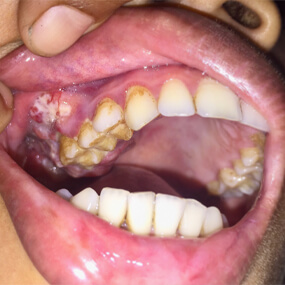How a Clean Mouth Leads to Better Overall Health

Oral health has been called a window to overall wellness. Many health problems manifest oral symptoms, and gum disease is correlated to a broad range of health complications, including diabetes, cardiovascular disease, and dementia. Your saliva is particularly revealing. It contains DNA, enzymes, hormones, and proteins and is an excellent indicator of systemic diseases and your immune system.
Saliva testing has become quite advanced in recent years and has replaced much routine blood testing. Testing saliva is simpler, less invasive, and less expensive. It is quite effective for early diagnoses, and it can detect practically any condition that affects the entire body, such as HIV. It can reveal some cancers, illicit drug use, environmental toxins, Parkinson’s disease, cirrhosis of the liver, proteins that indicate osteoporosis, antibodies and hormones that point to hepatitis, as well as cortisone, which is a stress response in newborns. You can even test yourself with an over-the-counter saliva testing kit.
Saliva and Your Health
Saliva begins the process of digestion. It also washes away food particles, bacteria, and acids that contribute to gum disease and tooth decay. Saliva is also an aspect of your immune system. The antibodies in your saliva protect you against viral pathogens, such as the common cold and even HIV. Proteins in your saliva are imperative to inhibiting fungal growth, which is why a person with a weakened immune system can be prone to oral thrush—a fungal infection. Saliva even inhibits the growth of certain bacteria that can lead to many different illnesses.
The Link Between Dental Plaque and Disease
Within your mouth is a community of microorganisms, including more than 500 distinct bacteria. A reaction occurs between that bacteria, your saliva, and particles from the food you eat. It causes dental plaque—a sticky film that sticks to your teeth and secretes acids over time. Regular brushing and flossing are imperative to cleaning as well as disrupting plaque. Undisturbed plaque can harden into dental calculus within just 24 hours. Often called tartar, calculus generally cannot be removed by brushing. Both plaque and tartar contribute to halitosis but also tooth decay and gum disease.
The first stage of gum disease is gingivitis, and it is still reversible at this point. Gingivitis can soon develop into periodontitis, which is a much more advanced gum infection. It can be halted and managed, but the gum disease is no longer reversible at this point. There is an even more advanced stage of gum disease commonly called trench mouth. This form of the disease is rare but can still occur and is often characterized by ulcerations that have spread beyond the gums to the surrounding tissues.
Oral Bacteria and Infection
Saliva is a natural defense mechanism—often the first line of defense. In a healthy person, oral bacteria do not generally enter the bloodstream. But a person who has gum disease or has recently undergone an invasive dental treatment is susceptible to various access points emerging in the mouth.
In such cases, even brushing and flossing can allow oral bacteria to enter the bloodstream. In a healthy person, the bacteria will be detected, and the immune system will quickly dispose of it. In a person with a weakened immune system, however, an infection can occur. Infective endocarditis, for instance, occurs when oral bacteria reaches the heart and attacks the inner surfaces, such as the valves.
Bad Habits Can Contribute to Poor Oral Health
Many people have bad habits that may seem relatively minor but can have a very significant effect on their oral health over the long-term. An example is biting your nails or chewing on toothpicks or pens. It may seem harmless, but it introduces bacteria, wears down enamel, and creates undue stress that can lead to misalignment. People who chew their nails are even more susceptible to plaque. Some people use their teeth to rip open packages, open bottle caps, and so on, and while using your teeth as a tool may only result in occasional abuse, it is among the leading causes of dental damage.
Tongue, lip, and other oral piercings are another way that people inadvertently affect their oral health. Studs and other jewelry can rub against gums, which can lead to wear and even wounds. There is also the potential to bite down on a piercing, and these objects can cause a great deal of damage if you are involved in a car accident or a slip and fall. People who smoke cigarettes or chew tobacco are more prone to gum disease as well as dry mouth, which compounds the situation. Smoking even affects the blood vessels in your gums, which can make the symptoms of gum disease harder to detect.
Perhaps the least obvious bad habit people have is brushing too often or too hard. Zeal to remain plaque-free can cause wearing down of the enamel and weakening of the gums. Sugar is renowned for its ability to rot teeth, but starches—such as from potato chips—can be just a bad. Acids are also terrible. Sour gummies are among the worst foods you can eat, and diet sodas are often worse for your teeth than sugary sodas due to all the acids mixed in to bolster the flavor. Limit your intake, sip with straws, rinse with water after you snack, and chew sugar-free gum to promote saliva production.
Optimizing Your Oral Health
Maintaining healthy teeth and gums is just as important as regular exercise and a well-balanced diet. Almost all oral health issues start with plaque, so it should be your focal point. The American Dental Association recommends brushing once in the morning after breakfast and again at night before bed. Use fluoride toothpaste and a soft-bristled brush. Brush for at least two minutes and no more than three minutes. Take care to brush every surface of every tooth. Be gentle. There is never any need to scrub. Floss once a day. Your pre-bedtime routine is an excellent time to floss.
Avoid tobacco use. Even occasional use is terrible for your mouth. If you are prescribed medications that may affect your teeth and gums, discuss them with your dentist. See your dentist regularly. Healthy people should visit their dentists every six months for a cleaning and an exam. Patients with gum disease may be advised to visit four times a year. Your dentist will be able to identify oral health issues before they become serious and can also be integral to the early diagnoses of overall health issues.
Emphasize Oral Health as You Focus on Total Health
Visiting with Jeffrey D. Clark, DDS, at least twice a year is essential to good oral health. It is also vital to longevity and overall health. Not only will Dr. Clark help you remain free of gum disease and tooth decay, but he will perform comprehensive examinations that can identify prediabetes, diabetes, oral cancers, obstructive sleep apnea, and many other health complications. Call Scottsdale Cosmetic Dentistry Excellence at 480 585 1853 with any questions you may have and to schedule your next checkup.




